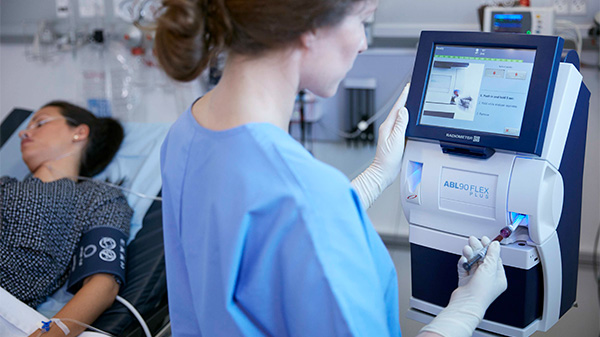Key Trends in the Blood Gas and Electrolyte Analyzer Market
Introduction
Blood gas and electrolyte analyzers are critical diagnostic tools for measuring various parameters in blood samples. They provide valuable insights into a patient's acid-base balance, respiratory status, and electrolyte levels. These analyzers play a vital role in critical care, emergency medicine, and various clinical settings. As technology advances, new trends are shaping the landscape of blood gas and electrolyte analysis. In this blog, we will explore the key trends that are transforming the blood gas and electrolyte analyzer industry.
1. Point-of-Care Testing (POCT)
The shift towards point-of-care testing is a dominant trend in healthcare, and it is significantly impacting blood gas and electrolyte analysis. POCT enables rapid testing at the patient's bedside or in clinics, offering real-time results without the need for sample transportation to a central laboratory. This trend has led to the development of compact and portable blood gas and electrolyte analyzers, allowing quick and efficient testing, especially in emergencies.
For instance, in May 2020, Roche Group unveiled a new blood gas digital solution designed to streamline and enhance point-of-care testing. The innovative solution, known as the Roche Blood Gas Digital Solution, integrates advanced technology and connectivity to enable real-time data management and analysis. This development aims to improve efficiency, accuracy, and patient care by providing healthcare professionals with immediate access to critical blood gas results and actionable insights at the bedside.
2. Growing Demand for Portable/Handheld Devices
The demand for portable/handheld blood gas and electrolyte analyzers has grown rapidly in recent years, bolstering the blood gas and electrolyte analyzer market. These devices offer high precision, convenience, and quick sample turnaround, which make them especially suitable for emergency medical procedures. As a result, healthcare professionals are increasingly turning to portable devices to measure critical parameters such as pH level and electrolyte concentration quickly and accurately.
Several companies have introduced a variety of portable blood gas and electrolyte analyzers. This analyzer utilizes advanced technology and sensors to provide fast and accurate results, enabling timely decision-making and immediate intervention. They often feature user-friendly interfaces and simplified operations, making them suitable for many healthcare professionals.
For instance, in April 2021, Siemens Healthiness launched the epoc Blood Analysis System. It is a portable and wireless solution that combines full blood gas, a basic metabolic panel, and measurements of hematocrit and lactate on a single test card that remains stable at room temperature. Moreover, the device provides results at the patient's location in under a minute. Thus, portable devices have gained widespread adoption due to their remarkable precision, convenience, and rapid sample processing capabilities, rendering them particularly well-suited for urgent medical situations.
3. Multi-Parameter Analysis
Blood gas and electrolyte analyzers have evolved to provide multi-parameter analysis, enabling the simultaneous measurement of several critical parameters from a single blood sample. This advancement streamlines the testing process, saves time, and reduces the amount of blood required from patients. Clinicians can obtain comprehensive data, including pH, pCO2, pO2, electrolytes (sodium, potassium, chloride), and more, in a single run.
For example, the combined blood gas and electrolyte analyzer are advanced medical devices that integrate the functionalities of a blood gas analyzer and an electrolyte analyzer into a single system. These analyzers offer a comprehensive approach to analyzing a patient's blood by measuring and analyzing gases, pH, electrolytes, and other essential parameters. With sophisticated sensors and technology, the combined analyzer provides fast and accurate results, enabling healthcare professionals to assess the patient's acid-base balance, oxygenation status, electrolyte levels, and others.
4. Advancements in sampling technology
Advancements in blood gas and electrolyte analyzers are revolutionizing patient care by introducing non-invasive sampling techniques and improved sensor technology. These innovations bring numerous benefits, such as enhanced accuracy and sensitivity in measurements, increased patient comfort, and fewer complications. Non-invasive sampling eliminates the need for invasive procedures, making monitoring more comfortable and enabling frequent checks. Moreover, advanced sensor technology enhances reliability and precisely detects even minor concentration changes. This integration improves patient care and enables real-time and continuous monitoring for personalized management. As a result, it presents a promising market landscape, driving efficiency gains and improved healthcare outcomes.
5. Introduction of digital solutions and robotics in blood gas and electrolyte analyzer
The introduction of digital solutions and robotics in blood gas and electrolyte analyzers has revolutionized the way healthcare professionals diagnose and monitor patients' conditions. These advanced technologies have significantly improved the efficiency, accuracy, and ease of conducting blood gas and electrolyte tests, which, in turn, benefit patients and medical staff.
With digital solutions, data collection and analysis have become more streamlined and automated, reducing the human errors and enhancing the turnaround time for test results. Advanced algorithms and machine learning capabilities in these analyzers help interpret complex data, enabling quicker and more precise diagnoses than before.
In May 2020, Roche v-TAC introduced a novel digital diagnostics solution enabling clinicians to obtain arterial blood gas values from patients requiring blood gas testing. This method utilizes a simpler, less painful, and minimally invasive venous approach, offering a more comfortable experience for the patients. Roche v-TAC is fully integrated with Roche's cobas b 123 POC and cobas b 221 systems by using the Roche cobas infinity POC solution. This seamless integration ensures efficient and accurate data transfer and reporting. It streamlines the diagnostic process and enhances patient care. The introduction of Roche v-TAC represents a significant advancement in blood gas analysis, offering a more patient-friendly and accessible approach to obtaining critical diagnostic information.
Moreover, in July 2022, Radiometer partnered with Technicon to develop a robotic solution for blood testing. Both companies aim to combine their expertise in medical diagnostics and laboratory automation. The collaboration aims to streamline workflow, minimize errors, and improve turnaround time for test results. By integrating Radiometer's analyzers with Technicon's automation technology, the partnership seeks to revolutionize blood testing processes and enhance patient care in laboratories.
Conclusion
As these trends evolve, blood gas and electrolyte analyzers will play an increasingly integral role in delivering efficient, accurate, and personalized healthcare solutions. By staying at the forefront of these trends, healthcare providers can leverage the latest advancements to enhance patient outcomes and optimize clinical workflows. As we move forward, integrating technology and diagnostic excellence will shape the future of blood gas and electrolyte analysis, revolutionizing point-of-care testing for the benefit of patients worldwide.
About The Author
 Sikha Haritwal is a researcher with more than 3 years of experience. She has been keeping a close eye on several industry verticals, including technology, cloud, cyber security, and consumer electronics. She has an avid interest in writing news articles and hopes to use blogs as a platform to share her knowledge with others. When she is not following industry updates and trends, she spends her time reading, writing poetry, cooking, and photography. The author can be reached at sikha.haritwal@nextmsc.com
Sikha Haritwal is a researcher with more than 3 years of experience. She has been keeping a close eye on several industry verticals, including technology, cloud, cyber security, and consumer electronics. She has an avid interest in writing news articles and hopes to use blogs as a platform to share her knowledge with others. When she is not following industry updates and trends, she spends her time reading, writing poetry, cooking, and photography. The author can be reached at sikha.haritwal@nextmsc.com


Leave a Reply